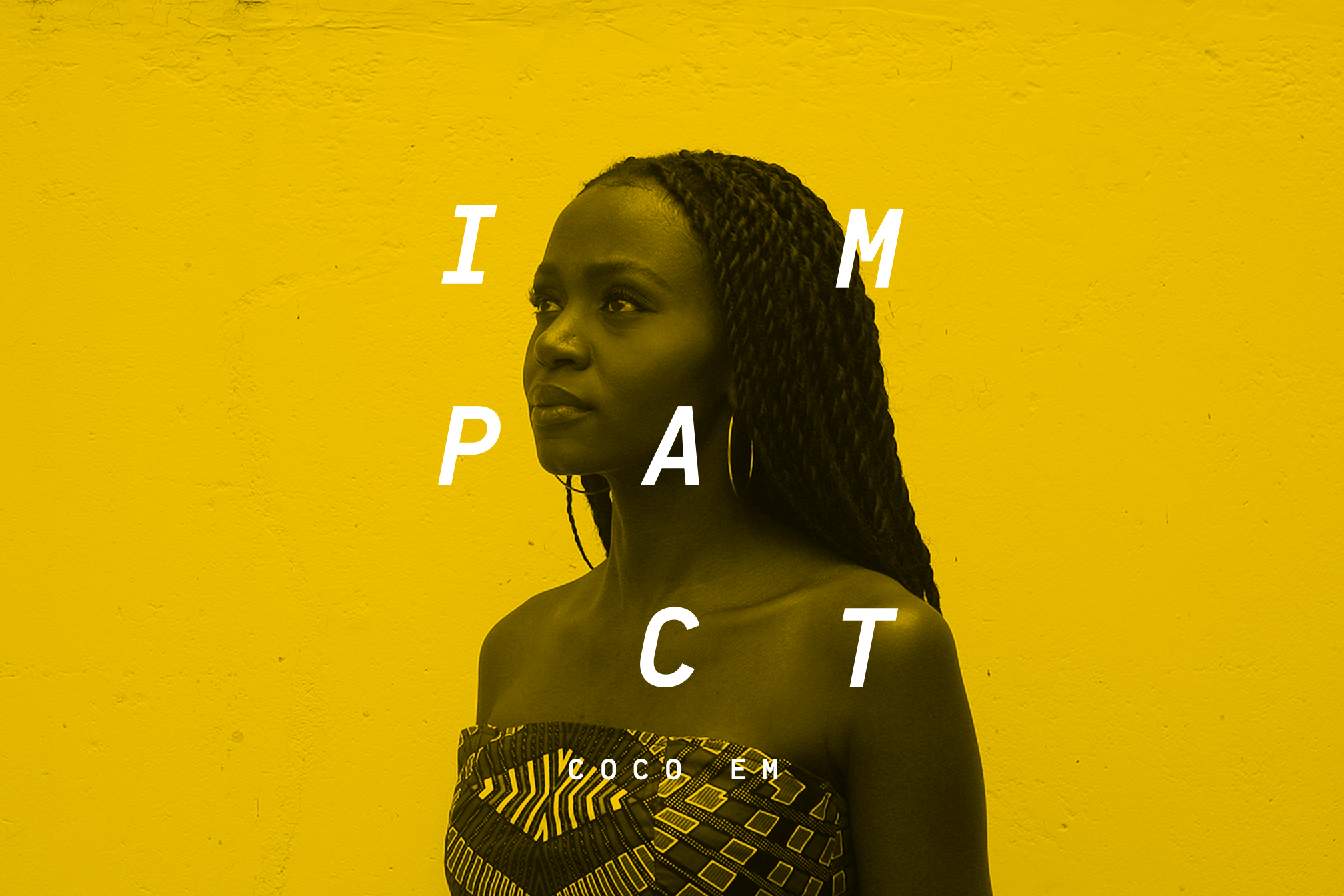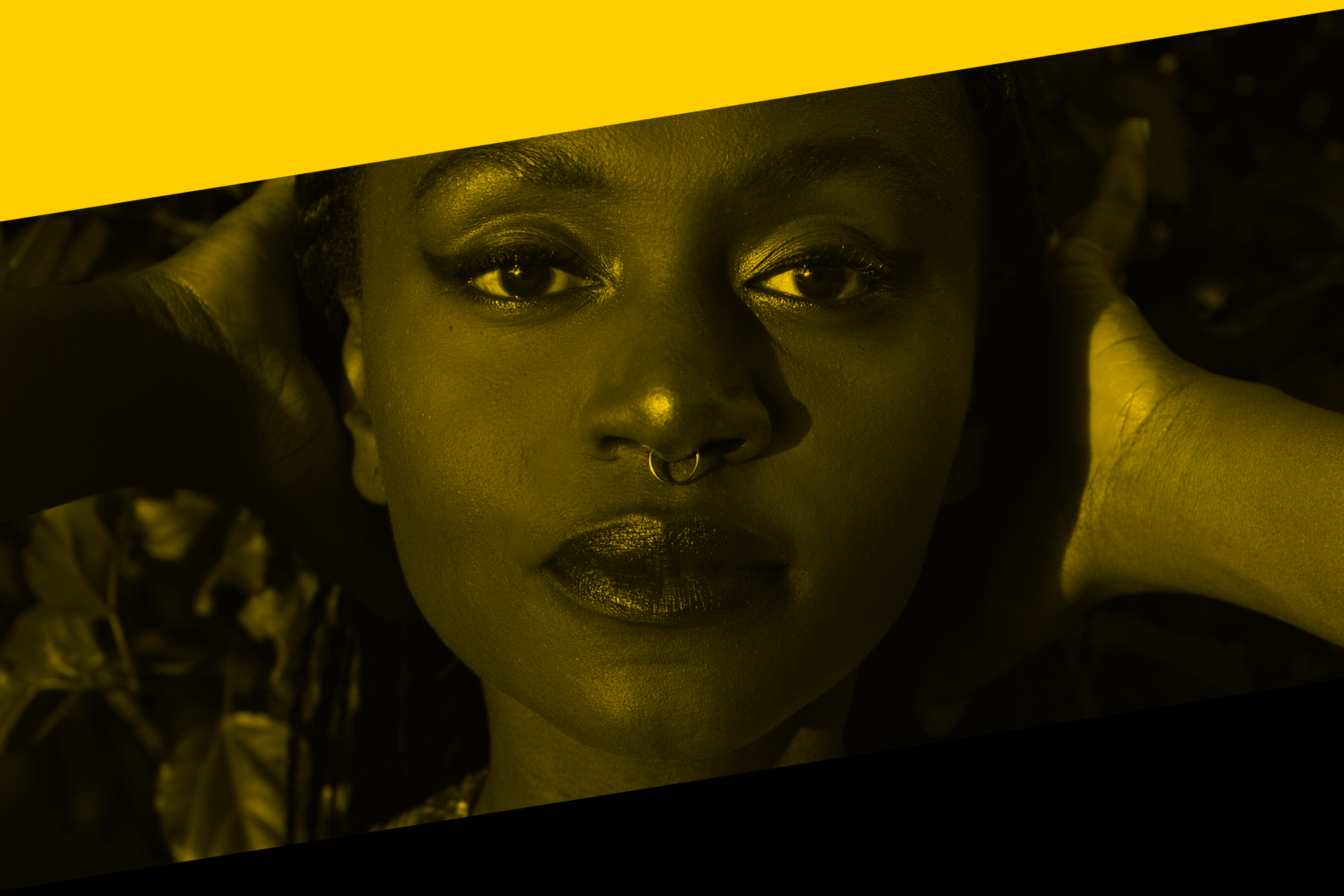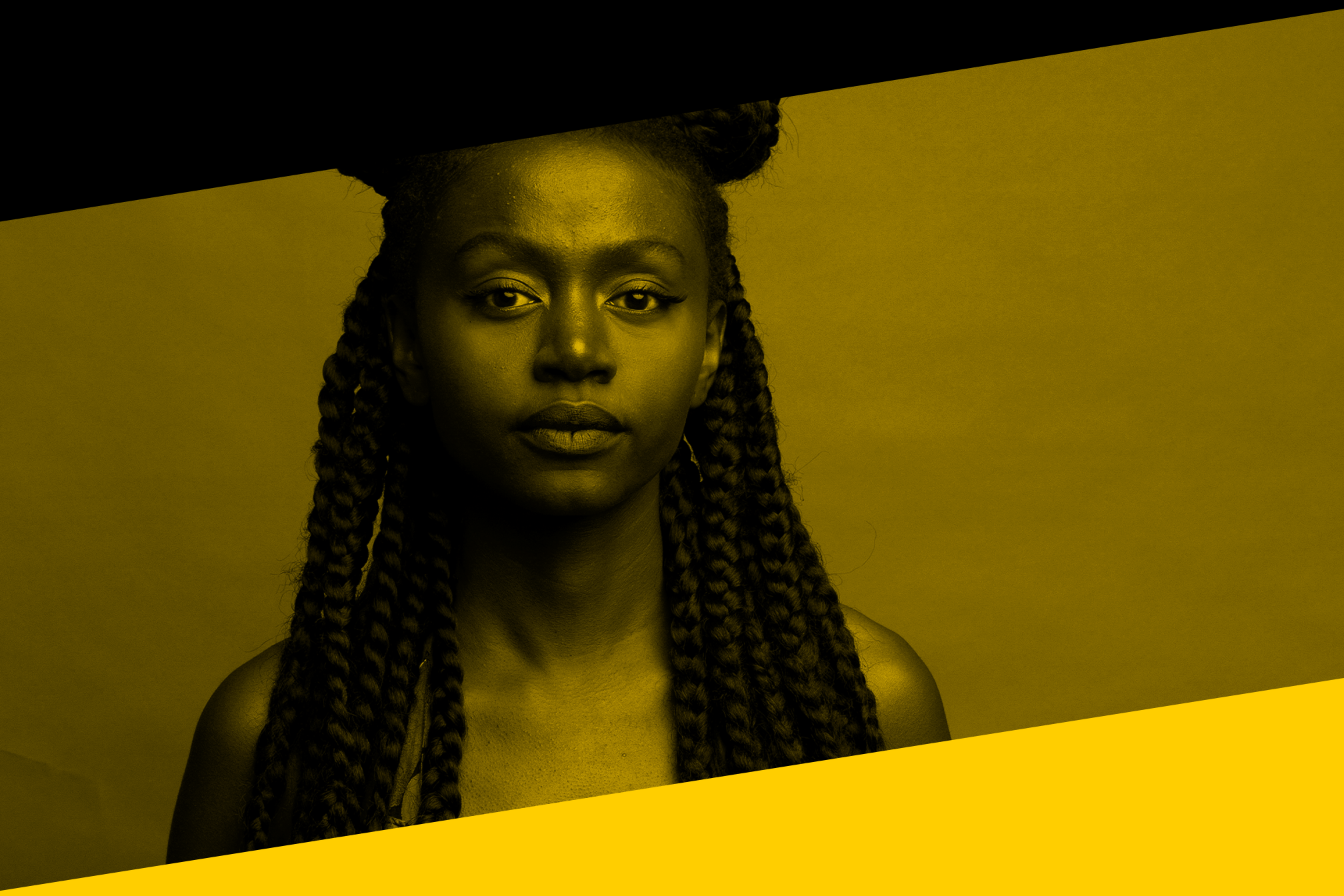 Impact
Impact
Black first: Coco Em's empowering dance music is uplifting East Africa's femme artists
The DJ and producer talks to Becky Buckle about waving the flag for Kenya, protest through music and warming European crowds to amapiano
Coco Em is on a roll. Currently travelling the world with her debut EP 'Kilumi' she's seen in a collaborative show on NTS with Earl Sweatshirt and Bone Soda and a prime time slot at Glastonbury's iconic Stonebridge Bar already this Summer, she's still found time to highlight her East African contemporaries through her community-focused collective Sim Sima.
Born and raised in Nairobi, much of Coco's early musical inspiration comes from her mother, who would listen to records by Franco and other Lingala artists: Koffi Olomide, Madila, Yondo Sister and of course, Madonna. These moments in her early years would imprint the artist she would later become, motivating her to produce her own sound towards the start of the pandemic.
This newfound talent for production led her to create the deeply personal seven-track debut EP ‘Kilumi’. Released earlier this year, Coco made the EP in the very depths of the pandemic and used this troublesome time to “explore elements of different sounds that kept me going in a very difficult year. It takes on different paths each time a song starts,” she says. Coco dedicated every day to creating a new beat which resulted in over 70 samples.
A standout track on the EP is ‘Land (Black) First’ which was originally named ‘Land First’ however, Kasiva — who features on the track — misheard the words therefore the name was changed. Coco explains that: “It’s a powerful statement I made to a beat I had initially pitched to Sho Madjozi in 2018 for her Sena Ala music challenge. I didn’t make it, but I developed the track to what it is now.” 'Kilumi’ was completed within Santuri East Africa studios, which is a Nairobi-based non-profit organisation that’s goal is to empower and support East African artists.
Read this next: Kenya’s hip hop culture is revitalizing the genre as a force for change
When Coco isn’t making music, you can find her working within her collective, Sim Sima. The voracous tagline: “Sauce For Your Ngima” says it all, Coco is the founder of the creative community that provides music training in a range of fields, prioritising those from the femme, non-binary and LGBTQ+ backgrounds.
We caught up with Coco to speak about the success of her album and to learn more about the music coming out from Kenya. Check out her Impact mix and Q&A below.

Can you tell me how your moniker "Coco Em" came about?
Coco stands for chocolate and Em is short for my real name — Emma. I came up with the name around 2008 when I was working with a film crew in Malaysia. Someone sent me 'Emma' by Hot Chocolate and I thought, hmm, my skin does like chocolate, so I started using the name Coco.
How would you describe yourself as an artist in five words?
I would describe myself as inquisitive, curious, shy, bold and hungry.
What gives you inspiration?
For my music production, I gain musical inspiration from different things in my life. I could be in traffic and hear someone drive by with music blasting and combine those sounds to the sounds of the car engine revving and come up with a beat. I also really like the musical arrangement of classical music, so much drama! I try to recreate chords and harmonies that I like and build on those. When I’m curating DJ sets my mood influences what I listen to which in turn influences how I curate my sets. No genre is off-limits for me. I particularly like it when two different sets of genres are mashed-up together to create something fresh.
When were you first interested in music and did DJing or producing come first?
My interest in music stems back to my childhood — I listened to a lot of Lucky Dube growing up. Later on, I developed tastes for a lot of different styles of music: hip hop, classical music, rock, and moody indie tunes from this online radio station called Stereomood I was introduced to back in 2008. Djing for me came first. I had been sharing tunes on my Facebook page and a friend encouraged me to get into it because he thought my selection was good. Later on, I dated a DJ who also produced who also encouraged me to do it. We would make mixtapes for each other, and mine were more of a full mix rather than a selection of tracks. It was fun to put these together.
Read this next: In Session: Scorpion Kings
What are some of your stand-out favourite gigs?
Currently, playing Infine’s 15-year anniversary celebration in Lyon this year is one of my favourite gigs. The crowd started off a bit confused at my amapiano selections, but they warmed up to the music so well and by the hour mark the room was at full capacity, everyone sweating from all the dancing. The great sound at the venue, Heat Lyon, also really got me in a great head space for the show. I also really enjoyed myself at my first gig in Swaziland a few weeks ago for the MTN Bushfire festival.
What are some sounds coming out of Kenya that we should know about?
There is a vibrant electronic music scene in Nairobi being nurtured by organisations such as Santuri East Africa. The music coming out is an explorative and eclectic mashup of sounds ranging from the newly formed genres gengetone (genge music and reggaeton) shrap (Sheng Swahili language mixed with Trap Hip hop sounds) house, techno and tech house bangers from artists Budalagi, Munyasya, ambient music exploring the use of field recordings from artists such as KMRU, Nyokabi Kariuki and DJ Raph, the Changanya genre moulded by singer/songwriter and producer Nabalayo and a lot more. There are also producers pushing the amapiano sound in the scene as well as a very big reggae music movement. It is great to note that everything I’ve just mentioned is only from Nairobi and Kenya as a whole has so many different cultures and tribes creating their own sounds and expressions.
Your debut EP, ‘Kilumi’ has a mix of electronic genres from blending amapiano to trap — why is incorporating a wide range of sounds and style in your work important?
Incorporating a wide range of sounds comes naturally to me. When I create I like for my expression to be honest and so I don’t fight what I feel is moving me at that particular time. When creating this album, I had started listening to a lot of amapiano music and had just been introduced to the artist called Nazar (Hyperdub) from Angola whose sound fuses a lot of techno/noise elements with groovy bass and percussive rhythms. I was feeling low from the pandemic but at the same time very excited about the exploration of new sounds. I normally get a bit bored from listening to one sound at a time — I like to switch it up every now and again.

There are many features on ‘Kilumi’ — can you tell me a bit about them and why you chose to include them?
Each feature on 'Kilumi' is very special to me. I had the opportunity to meet with the artists after spending time working at the Santuri studios space. I typically have social anxiety and like to work alone when I can, but collaborating and forming chemistry with different artists was an interesting discovery for me. The first artist to collaborate with was Janice Iche on the track 'Mbeni'. I was keen to work with Janice after she had completed a Sim Sima workshop funded and supported by Santuri and a Music in Africa grant we secured. Iche who is based in Mombasa was in Nairobi for the workshop and during her stay, I played her some of the demos I’d made and she immediately gravitated to 'Mbeni'. Similarly with the fire rap duo MC Sharon and Wuod Baba on the track 'Winyo Nungo'. Wuod Baba had connected with me for a possible collaboration on a completely different project and I had been a fan of his and Sharon’s music for a long time, so our crossover worked out perfectly. 'The Land (Black) First' with Sisian and Kasiva was a collaboration I had to have owing to the bold nature of both artists involved and their previous work, cultivating and preserving African culture. And lastly, my collaboration with Labdi was one I was keen to have from years back. Labdi is a very talented musician, an orutu player (a traditional single-stringed instrument from the Luo community traditionally only played by men). She is bold and knows what she wants. Her vocals sat perfectly one on top of the other. The song ‘Pesa’ had the most tracks I had ever worked on in a single Ableton project. I am very pleased with how this song and the whole EP turned out.
Could you tell me about the message behind the track ‘Land (Black) First’?
'Land (Black) First' is a social commentary on the current state of a capitalistic-run society. Sisian the wonderful songwriter I collaborated with, was moved by the instrumental of the song immediately she heard it and explained that the words to this piece came quite effortlessly. We still to this day face great issues with land ownership and wealth distribution in Africa. The song was initially titled ‘Land first’ but after sending it to the amazing percussionist ‘Kasiva’ who I also collaborated with on this piece, she thought the chant was ‘Black’ first. It all made so much sense and so the new title 'Land (Black) First' came to be. This song in my view could be used as a protest song for anyone calling for land reforms in Africa.
Read this next: NTS announce amapiano compilation with previously unreleased track from Gaba Cannal
What is Sim Sima and how has it helped people?
Sim Sima was initially supposed to be a party where under-represented people in the music industry bring their unfinished beats and have them played at a cool party to industry professionals — but due to COVID I had to change this idea and develop it more for an online platform. Currently, Sim Sima is a small group of extremely talented femme artists and upcoming producers who share resources in music production with one another. The goal was to give access to music education to femmes interested in music production and to increase the number of femme producers in the country and in Africa. This was inspired by movements such as Femme Electronic which was started by Ugandan DJ Rachel, who noticed a huge gender gap in the Ugandan electronic scene.
What is coming up next for you?
Currently, I am in Europe on a small tour I have curated with the help of many of my friends and my booking agents. Owing to the complexities of attaining a visa, I am late to try out for the larger festivals, so I am using this tour as a sort of benchmarking process to gain a better knowledge of the different venues and festivals I can pitch to play at for next year. I am also in the planning stages of my first studio album to release next year under the French label Infine.
Can you tell us about your mix?
"Tough times never last, only tough people last”
This mix in some ways is a testament to my resilience in pursuing music as a career. I start off with a groovy remix by DJ Hlomzet and thereafter slide into some of my old-time faves Cooly G. Also featured are Nadio Dance's Pedicure, some new bangers from Kenyan heavyweight producer/DJ Budalagi and two tracks off my debut EP Kilumi - Pace and Mbeni featuring Janice Iche. I hope you dance and discover something you like.
Becky Buckle is Mixmag's Digital Intern, follow her on Twitter
Tracklist:
Bhizer 'Gobisiqolo' (DJ Hlomzet remix)
Cooly G 'Am'
Mr Luu 'My my my'
Batuk 'Gira' (Rudeboyz Gqom Remix)
Giandomenico Di Vito 'Kuduru' (original mix)
Forgotten Souls 'Hhaibo' ft Formation Boyz
Nadio Dance 'Pedicure'
Budalagi 'Kidole'
Daphni 'Ye ye'
Dean Eagle 'Butterfly Message'
Formation Boyz 'Kicker'
Formation Boyz 'Class Leynkwezeli'
Pedro 'Toques'
Breyth 'Preto No Branco'
Fiuk Snoop vs Paulo Staff 'Toza na Bongo'
Asna, AnyoneID 'Abissa'
Game Walla 'Kassumuna'
Color Plus 'Glint'
Coco Em 'Pace'
TDK Macassette ft Mdoovar 9umba 'Umsebenzi'
Toss, 9umba & Mdoovar 'Umlando'
Coco Em ft Janice Iche 'Mbeni'


